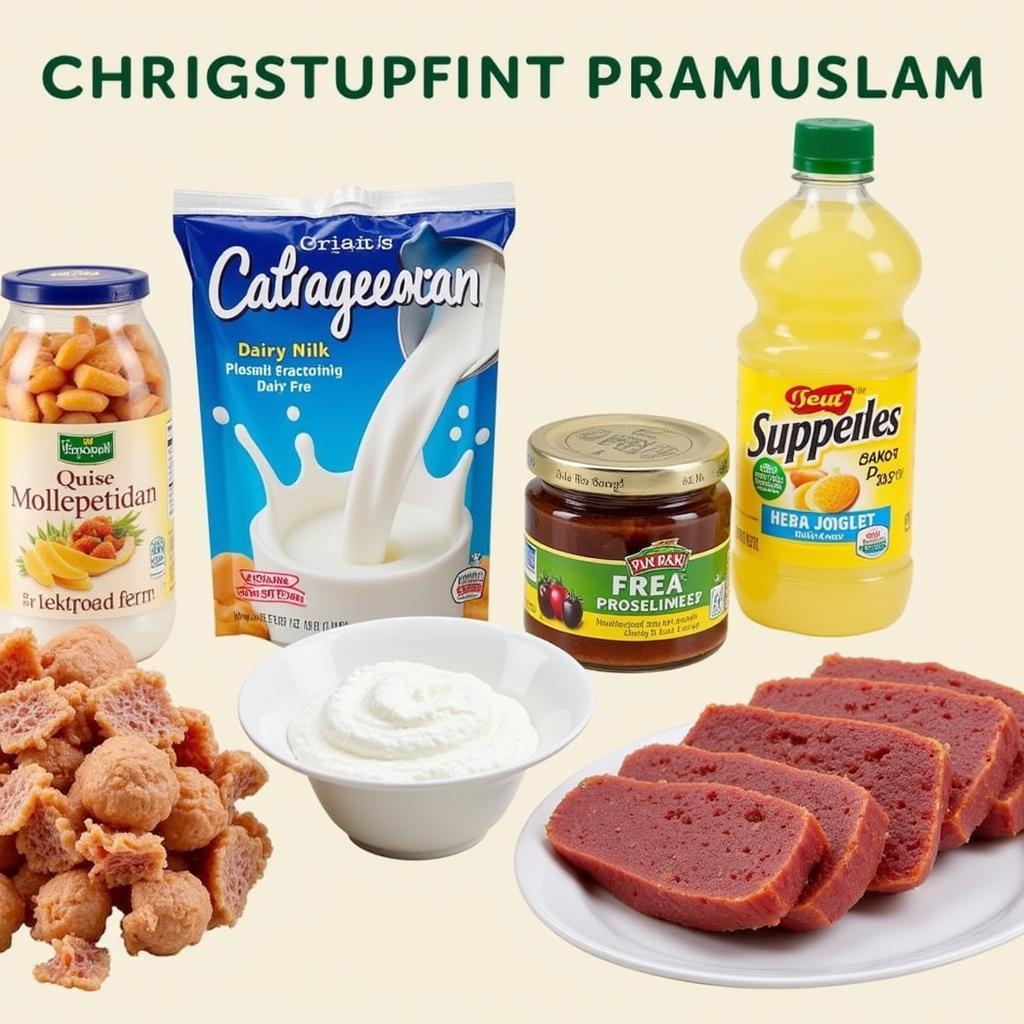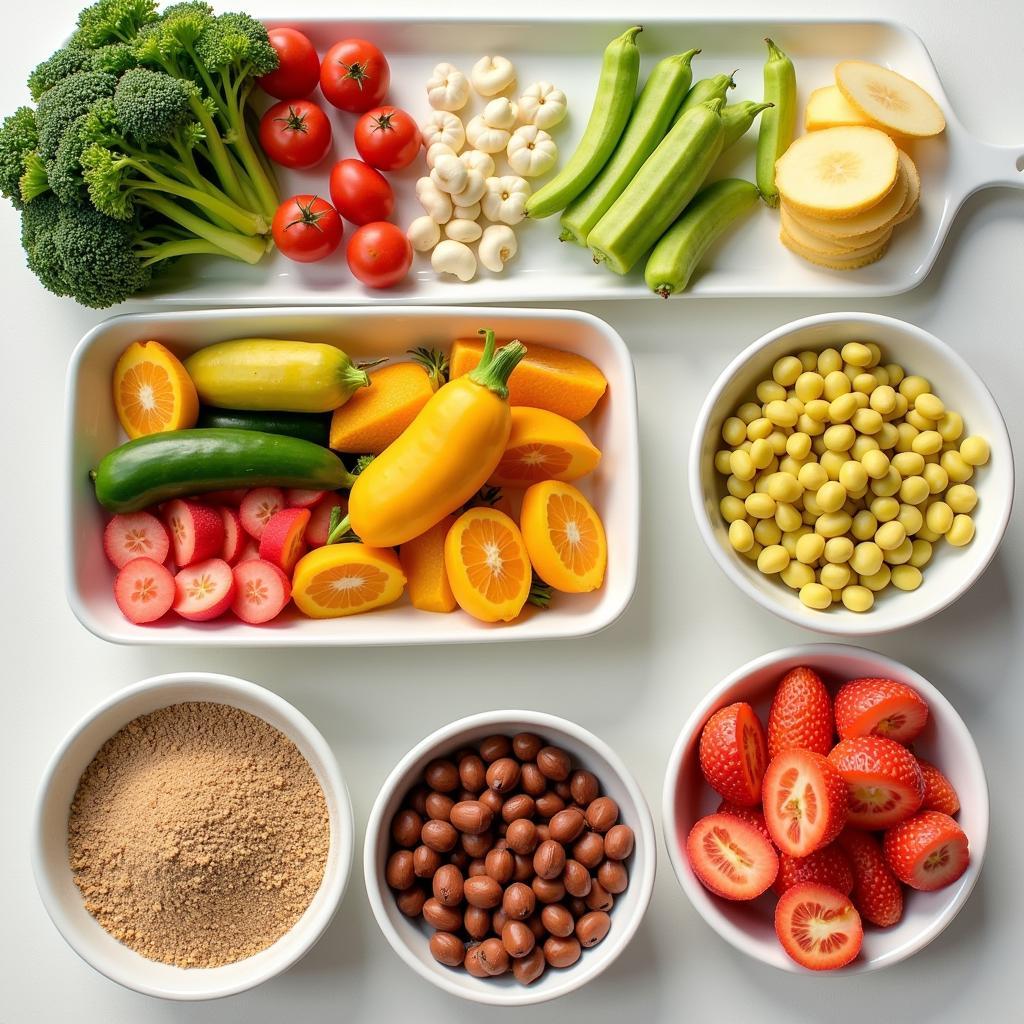Carrageenan Free Foods are becoming increasingly popular as people learn more about this common food additive. But what exactly is carrageenan, and why might you want to avoid it?
Carrageenan is a type of seaweed extract used to thicken, stabilize, and emulsify processed foods. While it’s generally considered safe to consume, some individuals experience digestive issues and inflammation after consuming carrageenan-containing products.
This comprehensive guide delves into the world of carrageenan free foods, exploring the reasons behind its exclusion, providing practical tips for identifying it on food labels, and showcasing a wide range of delicious alternatives.
Understanding Carrageenan: Friend or Foe?
Carrageenan, derived from red seaweed, is a popular ingredient in many processed foods. Its ability to create creamy textures and extend shelf life makes it a favorite among food manufacturers.
 Carrageenan in Common Food Products
Carrageenan in Common Food Products
While regulatory agencies deem carrageenan safe for human consumption, research suggests potential links to digestive discomfort and inflammation in some individuals.
Here’s what you need to know:
- Potential Digestive Issues: Some studies indicate that carrageenan may disrupt the gut microbiome, potentially leading to bloating, gas, and irritable bowel syndrome (IBS) symptoms.
- Inflammatory Response: Carrageenan has been shown to trigger inflammation in animal studies, raising concerns about its potential to exacerbate inflammatory conditions in humans.
While more research is needed to fully understand the long-term effects of carrageenan on human health, many individuals choose to avoid it as a precautionary measure.
Identifying Carrageenan on Food Labels
Avoiding carrageenan requires careful scrutiny of food labels. Here are some tips to help you spot it:
- Check the Ingredient List: Carrageenan must be listed as an ingredient on food labels.
- Look for Variations: It can appear under different names, including:
- Irish moss extract
- E407
- Refined carrageenan
- Pay Attention to Processed Foods: Carrageenan is commonly found in:
- Dairy-free milk alternatives
- Yogurt and other dairy products
- Processed meats
- Sauces and dressings
- Ice cream and other frozen desserts
Embracing a Carrageenan Free Diet: Tips and Alternatives
Transitioning to a carrageenan free diet is easier than you might think. Here are some practical tips to guide you:
- Read Labels Carefully: As mentioned, always check ingredient lists for carrageenan and its variations.
- Choose Whole Foods: Opt for fresh, unprocessed foods whenever possible, as they are less likely to contain additives like carrageenan.
- Explore Carrageenan Free Brands: Many brands offer carrageenan free alternatives for common food products.
- Get Creative in the Kitchen: Experiment with making your own sauces, dressings, and desserts at home using natural thickeners like chia seeds, flaxseeds, or agar-agar.
 Healthy Carrageenan Free Alternatives
Healthy Carrageenan Free Alternatives
Delicious and Nutritious Carrageenan Free Foods to Enjoy
A carrageenan free diet doesn’t have to be restrictive. There’s a world of delicious and healthy options to explore. Here are some ideas:
Fruits and Vegetables: All fruits and vegetables are naturally carrageenan free.
Grains: Opt for whole grains like quinoa, brown rice, and oats.
Legumes: Lentils, beans, and chickpeas are excellent sources of protein and fiber.
Nuts and Seeds: Enjoy a variety of nuts and seeds as snacks or add them to smoothies and salads.
Meat and Poultry: Choose fresh, unprocessed meat and poultry.
Fish and Seafood: Include a variety of fish and seafood in your diet.
“When creating a carrageenan free diet, it’s all about focusing on whole, minimally processed foods,” says Emily Carter, a registered dietitian. “By making simple swaps and reading labels carefully, you can easily reduce your intake and enjoy a variety of delicious and nutritious meals.”
Conclusion
Navigating the world of carrageenan free foods can seem daunting at first, but armed with the right knowledge and resources, it becomes an empowering journey towards a healthier lifestyle. By embracing whole foods, making informed choices, and exploring creative alternatives, you can savor the joys of eating while prioritizing your well-being. Remember, a carrageenan free lifestyle is about conscious consumption and enjoying a diverse and nourishing diet.
For personalized dietary advice, it’s always best to consult with a healthcare professional or registered dietitian.
Need help finding carrageenan free options? Contact us!
Phone: 02437655121
Email: [email protected]
Address: 3PGH+8R9, ĐT70A, thôn Trung, Bắc Từ Liêm, Hà Nội, Việt Nam.
Our dedicated customer support team is available 24/7 to assist you!